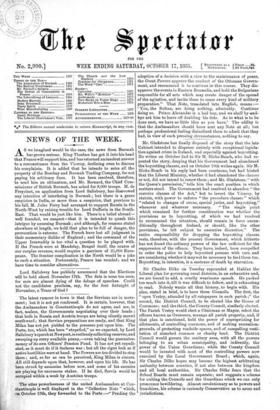Sir Charles Dilke on Tuesday expounded at Halifax the Liberal
plan for governing rural districts, in an exhaustive and,, we are bound to add, a cruelly wearisome speech. He packed too much into it, till it was difficult to follow, and is exhausting to read. Nobody wants all that history, to begin with. His plan, stated in brief, is to have three Councils. The first, the "open Vestry, attended by all ratepayers in each parish ;" the second, the District Council, to be elected like the House of Commons; and the third, the County Council, similarly elected. The Parish Vestry would elect a Chairman or Mayor, select the officers known as Overseers, manage all parish property, and, if that plan is sanctioned, hold the power of expropriating for allotments, of controlling commons, and of making recreation- grounds, of protecting roadside spaces, and of compelling resti- tution of absorbed common or charity land. The District Council would govern the sanitary area, with all the powers belonging to an urban municipality, and indirectly, the power of the Union Guardians; while the County Council would be invested with most of the controlling powers now exercised by the Local Government Board ; which, again, Sir Charles Dilke hopes may become the highest arbitrating authority between counties, if not also between the kingdom and all local authorities. Sir Charles Dilke fears that the School Boards must remain separate; and suggests a scheme for uniting the Councils and the Guardians which we can only pronounce bewildering. Almost revolutionary as to powers and franchises, his scheme is curiously Conservative as to areas and jurisdictions.


































